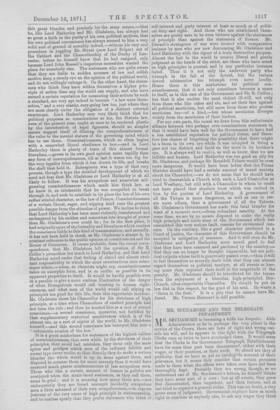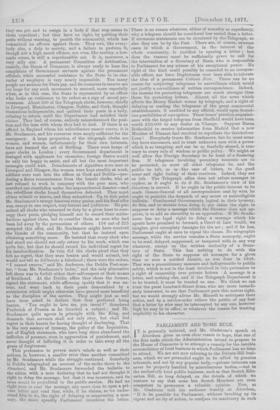MR. SCUDAMORE AND THE TELEGRAPH DEPARTMENT.
R. SCUDAMORE is becoming a trifle too despotic. Able .111 Administrator as he is, perhaps the very ablest in the service of the Crown, there are laws of right and wrong out- side his will, and he appears in this fight with the Telegraph Clerks once or twice to have overlooked them. It would seem that the Clerks in the Government Telegraph Establishment have for some time past been discontented, either with their wages, or their pensions, or their work. So afraid are they of publicity, that we have as yet no intelligible account of their grievance, but it seems they consider that certain promises made to them when the offices were taken over have not been thoroughly kept. Probably they are wrong, though, as we understand one of Mr. Scudamore s letters, he himself thinks they have some sort of a case ; but at all events, they grew first discontented, then impatient, and then furious, and at last tried to organize a general strike, This was, no doubt, a very grave error of judgment. Government employjs have as much right to combine as anybody else, to ask any wages they think
they can get, and to resign in a body if that step seems to them expedient ; but they have no right, by quitting their posts without warning, to punish the community, which has committed no offence against them. They owe, like every- body else, a duty to society, and a failure to perform it, though not a high moral offence, nor oven, like mutiny, a law- made crime, is still a reprehensible act. It is, moreover, a very silly one. A permanent Committee of Arbitration, namely, the House of Commons, is always ready to hear the complaints of Government servants against the permanent officials, while successful resistance to the State in its cha- racter of employer is very nearly impossible. Too many people are anxious for State pay, and its resources in reserve are too large for any such movement to succeed, more especially when, as in this case, the State is represented by an officer who looks on resistance to its orders as a sign of moral per- verseness. About 300 of the Telegraph clerks, however, chiefly in Liverpool, Manchester, Glasgow, Dublin, and Cork, thought themselves indispensable, and quitted their posts in a body, refusing to return until the Department had satisfied their claims, They had, of course, entirely misunderstood the posi- tion and the man with whom they had to deal. If there is an official in England whom his subordinates cannot coerce, it is Mr. Scudamore, and his resources were amply sufficient for the emergency. A largo proportion of the telegraph clerks are women, and women, unfortunately for their own interests, have not learned the art of Striking. There were heaps of spare clerks in London ; every Government department is besieged with applicants for vacancies ; foreign States would be only too happy to assist, and all but the most important messages could wait. Detachments of signallers were sent to Liverpool and Glasgow, the women were kept steadily at work, soldiers were sent into the offices at Cork and Dublin—pro- ducing a fierce remonstrance from the female clerks, who at last refused to work in company with the poor men, who marched out crestfallen under the unprecedented disaster—and the rebellious clerks found themselves defeated. They must either submit or starve, and they submitted. Up to this point Mr. Scudamore's energy deserves every praise, and his final offer was, except in one respect, very lenient and judicious. He per- mitted all clerks who returned to duty by a given hour to reoc- cupy their posts, pledging himself not to record their misbe- haviour against them, but to consider them as men who had been led away by the persuasions of others. 198 out of 213 accepted this offer, and Mr. Scudamore might have received the thanks of the community, but that he insisted upon obtaining something more. He insisted that every clerk who had stood out should not only return to his work, which was quite fair, but that he should record his individual regret for his insubordination. In vain did the clerks plead that they felt no regret, that they were beaten and would submit, but would not tell so deliberate a falsehood ; there were the orders, Jr I cannot swerve," said Mr. Anderson, the Dublin Post-mas- ter, " from Mr. Scudamore's letter," and the only alternative left them was to forfeit either their self-respect or their means of livelihood. At the Dublin office they chose the former, signed the statement, while affirming openly that it was un- true, and went back to their posts demoralized by a submission which might otherwise have proved most beneficial to the discipline of the service. They might just as well have been asked to declare that they preferred being beaten. "You ought to love me, you rascal I" thundered Frederick of Prussia as he thrashed a subject ; and Mr. Scudamore quite agrees in principle with the King, and demands that servants shall not only obey, but shall feel regret in their hearts for having thought of disobeying. That is the very essence of tyranny, the policy of the Inquisition, not of English statesmen, who have long since abandoned the infliction of penance, even in aggravation of punishment, and- never thought of inflicting it in order to take away all the grace of forgiveness.
This pretension to govern men's minds as well as their actions, is, however, a smaller error than another committed by Mr. Scudamore while the struggle continued. Somebody in Dublin telegraphed an account of the strike there to the Standard, and Mr. Scudamore forwarded the bulletin to the editor, with a note declaring that he had not thought it right to delay the message, but that it was incorrect, and its issue would be prejudicial to the public service. He had no right even to read the message, any more than to open a pri- vate letter and read that, while, if he claims, as we under- stand him to do, the right of delaying or suppressing a mes- sage, the more speedily Parliament interferes the better. There is no reason whatever, either of morality or expediency, why a telegram should he considered less sacred than a letter. If erroneous statements can be circulated by the Telegraph, so also they can be by the Post. There are, of course, extreme cases in which a Government, in the interest of the whole community, is justified in opening a letter ; but then the reasons must be sufficiently grave to call for the intervention of a Secretary of State, who is responsible to Parliament for any misuse of his exceptional power. No right of the kind could possibly be conceded to an irrespon- sible officer, nor have Englishmen ever been able to tolerate the idea of a permanent Cabinet Noir. There can be no reason for subjecting telegrams to surveillance which would not justify a surveillance of written correspondence. Indeed, the reasons for protecting telegrams are much stronger than those for protecting letters. Almost all the news which affects the Money Market comes by telegraph, and a right of delaying or reading the telegrams of the great commercial establishments, if confided to any official, would open bound- less possibilities of corruption. Three hours' previous acquaint- ance with the forged telegram from Sheffield would have been worth £10,000 to any dealer on 'Change. Suppose Baron Rothschild to receive information from Madrid that a new Minister of Finance had resolved to repudiate the Quicksilver Loan 1 Everybody trusts Mr. Scudamore, but ho must some day have successors, and to trust unknown men with a power which is so tempting, and can be so fearfully abused,. is con- trary to every rule of wisdom or public policy. We might as well allow the Foreign Secretary to be head of a financing firm. If telegrams involving pecuniary interests are to be protected, so must all other telegrams be, and the public be left, as in the case of letters, to the good sense and right feeling of their receivers. Indeed, they are so left. The Telegraph office does not refuse messages in cypher, as it ought to do if Mr. Scudamore's view of his functions is correct. If he ought in the public interest to be made Censor-General of all correspondence sent by wire, he ought to prohibit the despatch of any secret or unintelligible bulletin. Continental Governments, logical in their tyranny, do this, and to abstain from doing it, yet claim the right to suppress or delay a message which the Director does not ap- prove, is to add an absurdity to an oppression. If Mr. Scuda- more has no legal right to delay a message which his agents have promised to forward, a Court of Law would, we imagine, give exemplary damages for the act ; and if he has, Parliament ought at once to repeal the clause. No telegraphic message, while the service remains a State monopoly, ought to be read, delayed, suppressed, or tampered with in any way whatever, except on the written authority of a Secre- tary of State. This has nothing to do with the right of the State to suppress all messages for a given time or over a notified district, as was done in 1848. That was a precautionary measure and indispensable to public safety, which is not in the least involved in this pretension to a right of censorship over private letters. A message is a letter, and nothing else, and if the Telegraph Department is to be trusted, it must be treated as ono. We think we can trust the great Lombard-Street firms, who are more immedi- ately interested, to see that Parliament puts this matter right, but we would strongly advise Mr. Monsell to anticipate their action, and by a service-order relieve the public of any fear that a letter by wire may be intercepted by any ono, however high he may be in office, or whatever the reason for trusting implicitly to his character.











































 Previous page
Previous page